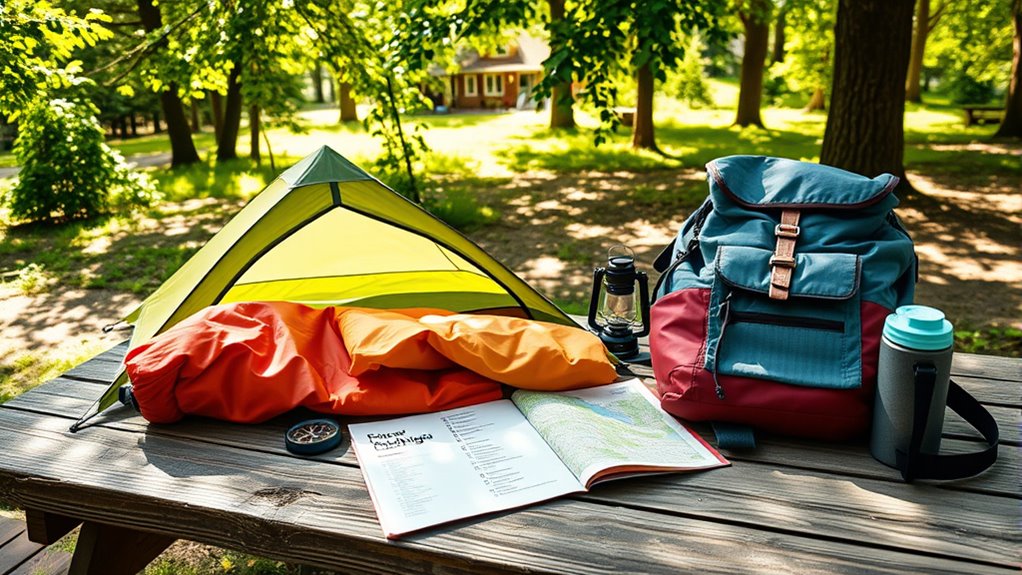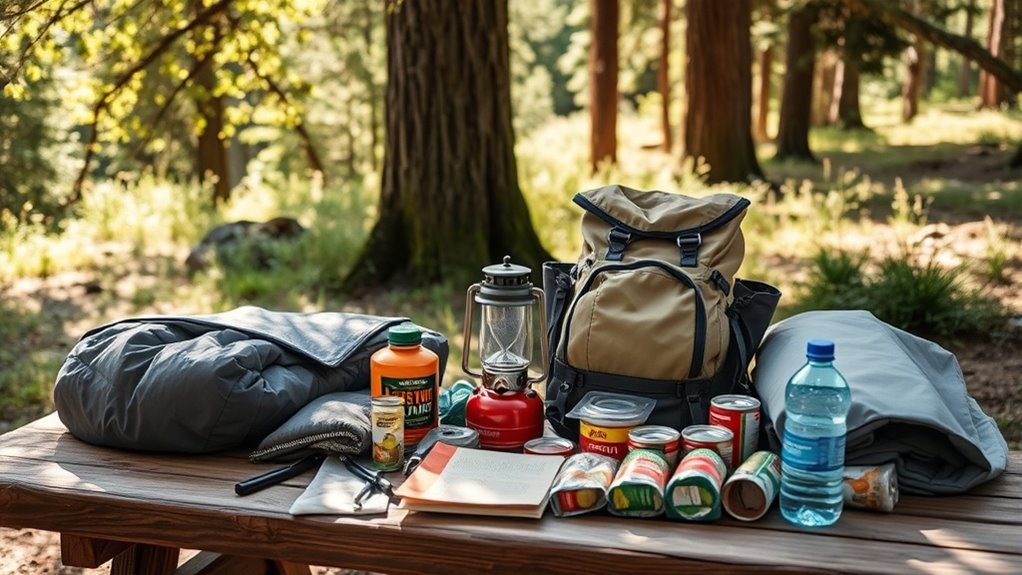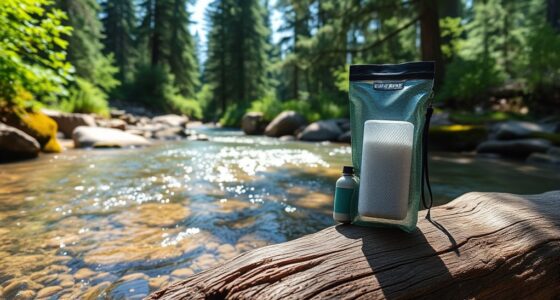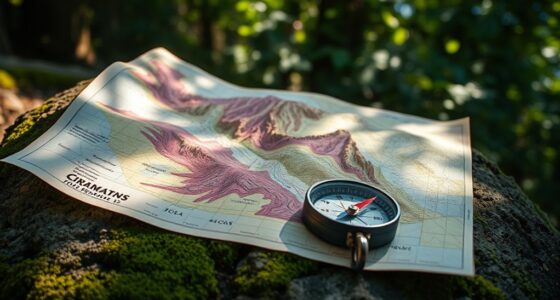As a first-time camper, you’ll want a checklist that covers essentials like a sturdy tent, sleeping gear suited for the climate, and weather-appropriate clothing. Don’t forget safety items like a first aid kit, insect repellent, and a multi-tool. Pack navigation tools, plenty of water, non-perishable food, and a portable stove. Keep your campsite safe and organized by following wildlife precautions. Keep going to uncover helpful tips for a smooth, enjoyable outdoor adventure.
Key Takeaways
- Pack essential camping gear such as a sturdy tent, sleeping bag, sleeping pad, and reliable lighting.
- Include safety items like a first aid kit, insect repellent, sunscreen, and fire-starting tools.
- Bring navigation devices, inform someone of your plans, and keep communication devices charged.
- Prepare sufficient non-perishable food, a portable stove, water purification tools, and enough water.
- Secure food to prevent wildlife attraction, keep the campsite organized, and follow safety guidelines.
Essential Tips for First-Time Campers

Camping for the first time can be both exciting and overwhelming, but having a solid checklist can make all the difference. When you’re preparing for your first outdoor adventure, the key is to pack smartly with the right camping gear and prioritize campsite safety. Your goal is to enjoy nature without unnecessary stress, and that starts with being well-prepared.
Begin by gathering essential camping gear: a sturdy tent, sleeping bag suitable for the weather, sleeping pad for comfort, and reliable lighting such as headlamps or lanterns. Don’t forget extra batteries or power banks, since staying illuminated after dark is indispensable. Pack clothing that suits the climate, including moisture-wicking layers, waterproof jackets, and sturdy footwear. Always bring rain gear, even if the forecast looks clear, because weather can change unexpectedly.
Pack essential gear: tent, sleeping bag, pad, lighting, batteries, and weather-appropriate clothing.
Campsite safety is a top priority, so include safety essentials like a first aid kit, insect repellent, and sunscreen. A multi-tool or pocket knife can come in handy for various tasks, and a fire-starting kit—matches or a lighter—ensures you can light a campfire for warmth or cooking. It’s wise to carry a map, compass, or GPS device, especially if you plan to explore beyond your campsite. Inform someone of your plans and expected return time before heading out, so others are aware of your location.
Food and water are also indispensable. Bring enough non-perishable food, along with a portable stove or grill if you plan to cook. Water purification tablets or a portable filter ensure you have access to clean drinking water, reducing the risk of illness. Hydration and nutrition keep your energy up for outdoor activities and help you stay alert.
Don’t overlook campsite safety beyond gear. Set up your tent in a safe, flat area away from potential hazards like falling branches, flood zones, or animal trails. Keep your campsite clean, storing food securely to avoid attracting wildlife. Maintain a safe distance from campfires and extinguish all flames completely before sleeping or leaving the site. Be aware of local wildlife and follow guidelines to prevent encounters or accidents.
Frequently Asked Questions
How Do I Choose the Safest Camping Spots for Beginners?
To select the safest camping spots for beginners, look for campgrounds with good amenities like clean water, nearby restrooms, and clear signage. Check the campsite regulations to guarantee the area is suitable for your experience level and that it’s well-maintained. Avoid isolated spots, and opt for well-populated campgrounds with park rangers nearby. This way, you’ll enjoy a safer, more comfortable outdoor experience tailored for first-timers.
What Should I Do in Case of Unexpected Weather Changes?
If unexpected weather changes occur, check the weather forecast frequently and stay alert for updates. If rain is imminent, quickly put on your rain gear to stay dry and warm. Seek shelter in a nearby tent, cabin, or sturdy structure to avoid exposure. Keep your valuables protected, and plan to adapt your activities accordingly. Staying flexible and prepared ensures you stay safe and comfortable despite sudden weather shifts.
How Can I Prevent Wildlife Encounters at My Campsite?
Did you know that proper food storage can reduce wildlife encounters by up to 90%? To prevent wildlife visits at your campsite, practice wildlife awareness by keeping food secured in bear-proof containers or hanging it away from your tent. Never leave food or scented items out in the open, and clean up thoroughly after meals. These simple steps help protect both you and local wildlife, ensuring a safer camping experience.
What Are Basic First Aid Tips for Common Camping Injuries?
You should always carry a well-stocked first aid kit with essentials like bandages, antiseptic wipes, and pain relievers. When treating cuts and scrapes, clean the wound gently with water, apply an antiseptic, and cover it with a sterile bandage. Keep calm, avoid probing the injury, and seek medical help if bleeding persists or if the wound is deep. Being prepared helps you handle common camping injuries confidently.
How Do I Properly Set up and Secure My Tent?
Did you know that a well-secured tent can withstand strong winds up to 50 mph? To properly set up and secure your tent, choose a flat, sheltered spot, and lay out the tent body. Use stakes to anchor corners, ensuring tension on the guylines for stability. Double-check all stakes and ties, and consider adding extra stakes for wind resistance. Secure your tent to prevent accidents and ensure a comfortable, safe camping experience.
Conclusion
Now that you know the basics, you’re ready to embrace the great outdoors with confidence. Remember, preparation prevents problems, so double-check your gear, gather your goodies, and get excited for unforgettable adventures. With a little planning and a lot of enthusiasm, camping becomes a carefree, fun-filled experience. So step outside, savor the scenery, and start creating memories that will last a lifetime. Happy camping, and may your outdoor escapades be endlessly enjoyable!









